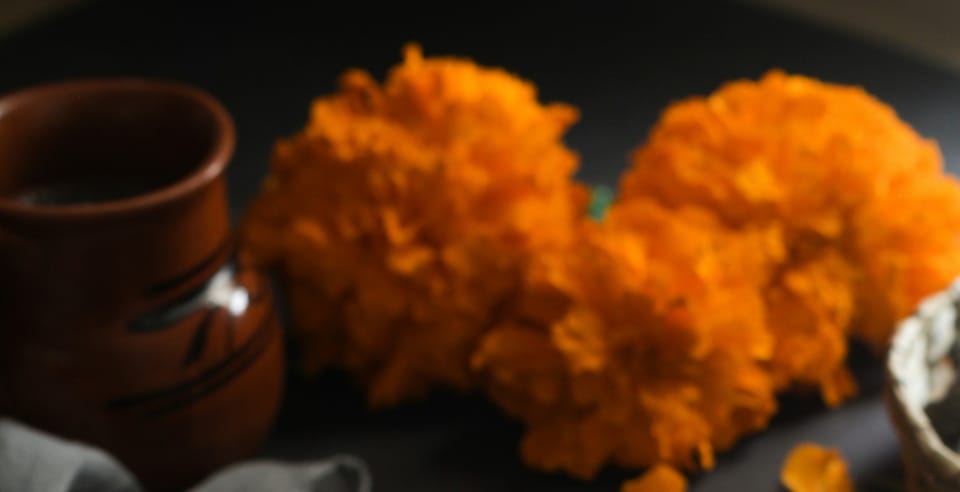Ofrenda and Processing Grief

Written October 14, 2024
October is often associated with the dead. People in Mexico start to put up their Ofrendas, an altar and offering to their ancestors and dead loved ones. Loss is an experience that all of us will experience. How we process loss, and the types of losses, are individual experiences.
There are six main types of loss: disenfranchised, anticipatory, ambiguous, compound or cumulative, traumatic, and complicated/Prolonged Grief Disorder. I will reflect on disenfranchised grief while exploring ways one could make meaning and process it. Ever felt like a loss you were experiencing wasn’t valid, where you were worried about being judged, or didn’t get enough support? This is what disenfranchised grief is, with examples being the death of a pet, abortion, miscarriage, stillbirth, death of a coworker, death by suicide, and even ambiguous losses such as a missing or abducted loved one (person or animal). Society often doesn’t validate and show understanding around these types of losses, leaving one’s grief intensified along with feelings of shame, isolation, and complicated grief. Ways of working through disenfranchised grief look like identifying a positive support system (those who can hold space and listen) and learning about grief and how it is not a linear path. Instead, it is very personal and can affect your life in 6 key areas (emotional, physical, cognitive, behavioral, social/familial, and spiritual/existential). Dose your grief by moving in and out of your grief, giving yourself breaks to do self-care and the things you enjoyed before your loss. Meaning-making is another powerful tool, such as creating a legacy in memory of your loved one. The Ofrenda mentioned above is an excellent representation of memorializing and ritualizing those you’ve lost. Find an area in your home that would make a meaningful space for an altar and time spent around it. Gather pictures of your beloved animals and family who have died, and place them on the altar. Next, find items that remind you of or once belonged to your loved ones. These items can be jewelry, a collar, a favorite food or toy, an urn or paw print, or anything that means something to you when you think of your loved ones. Adorn your Ofrenda with marigold flowers, which are believed to attract the souls of the dead to the Ofrenda by their rich smells and colors. Creating your Ofrenda and sitting with it in prayer, meditation, or conversation with your loved ones can help give you a ritual to make space and meaning for your grief.
Reflection: Fear of Causing More Harm
Sunday, I spent time in the woods with my dog. I was tasked with a nature-based experiential activity with the theme of caregivers. Reflecting on words associated with caregiving, my mind drifted through my own experiences of caregiving or helping others be the caregiver. When we brought my grandfather home for in-home hospice, we were immediately challenged with how to get him safely into the home and up the stairs where we had his bed and had set the space up for him. We had to call the fire department to help get him upstairs, and we were questioned and judged at first on why he was downstairs and what we were doing or not doing for his care. This feeling was scary that we could be doing something wrong, neglectful, not safe, and the shame of it all. Once we had him all situated, I was in awe that my mom could help him to the bathroom and provide his basic yet necessary needs. I wondered if this was something I could do for my mom and other close loved ones when the time came. These wonderings were scary, and I had a lot of second-guessing my strength and ability to give back once the time came.
As I held this phrase in my heart, “fear of causing more harm,” I wandered the forest floor, looking for an item representing strength and support as a caregiver. Picking a fungus commonly known as a turkey tail mushroom, I reflected on the natural cycle of life and death and that everything on earth plays a role, with fungus being essential. The turkey tail mushroom grows on dead and decaying logs, returning them to the soil for the next generation of plants to follow.

Inspecting my item with my five senses, I noticed the soft, velvety texture on top of it, the beautiful brown layers fanning out from the base, and its earthy aroma. I couldn’t hear the mushroom, but I was listening to the sounds of life all around me: my dog running around, birds chirping, and the wind rustling through the leaves. I decided not to taste the mushroom, as I wasn’t confident about the identification and didn’t want to find myself ill from this activity. The Turkey tail mushroom is often ground into powder and used in traditional Chinese medicine.
I reflected on the possible toxicity of a mushroom and how it makes one aware of their mortality. Mushrooms also provide food and medicine; knowing the right kinds can nourish or harm your body. As a caregiver, a lot of power is held in your hands, with one instance possibly resulting in life or death, healing or harming; however, at the base of it, all is your intention to do good and support your loved one in their process of end of life or long term illness. Like the mushroom, we serve a bigger purpose: restoring balance and energy to this world. The mushroom doesn’t second-guess its abilities and role on this earth, nor do we as caregivers. And as Breezer says, “Live with presence! Don’t despair about yesterday. Don’t fear tomorrow. Otherwise, you’ll miss out on the Gift of Today.”- (2005 B Brothers Press, edited by Doug Koktavy).
Member discussion